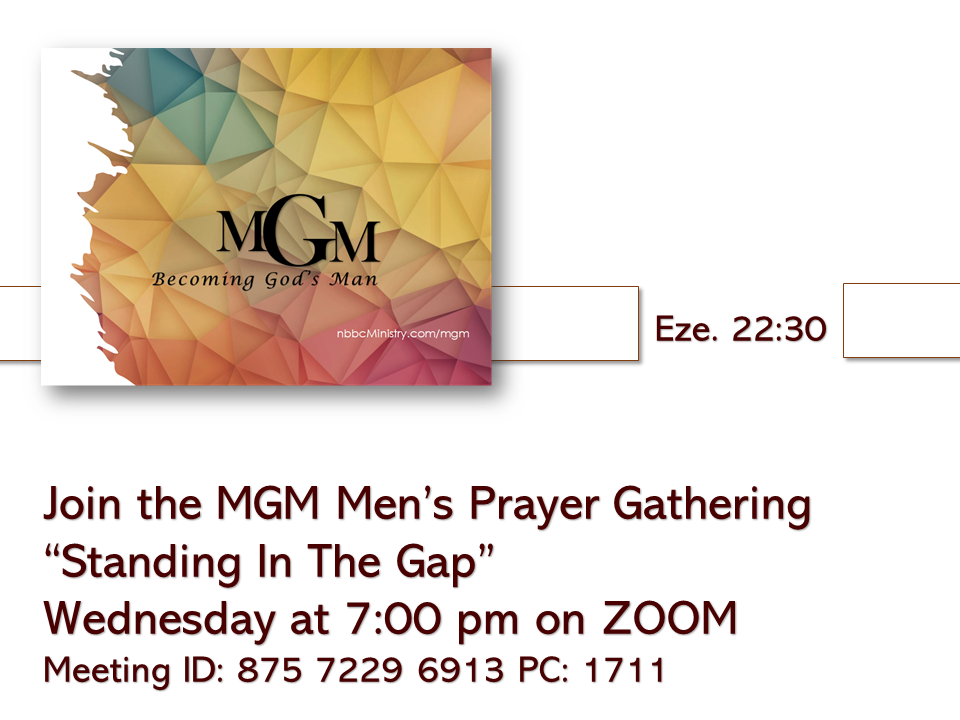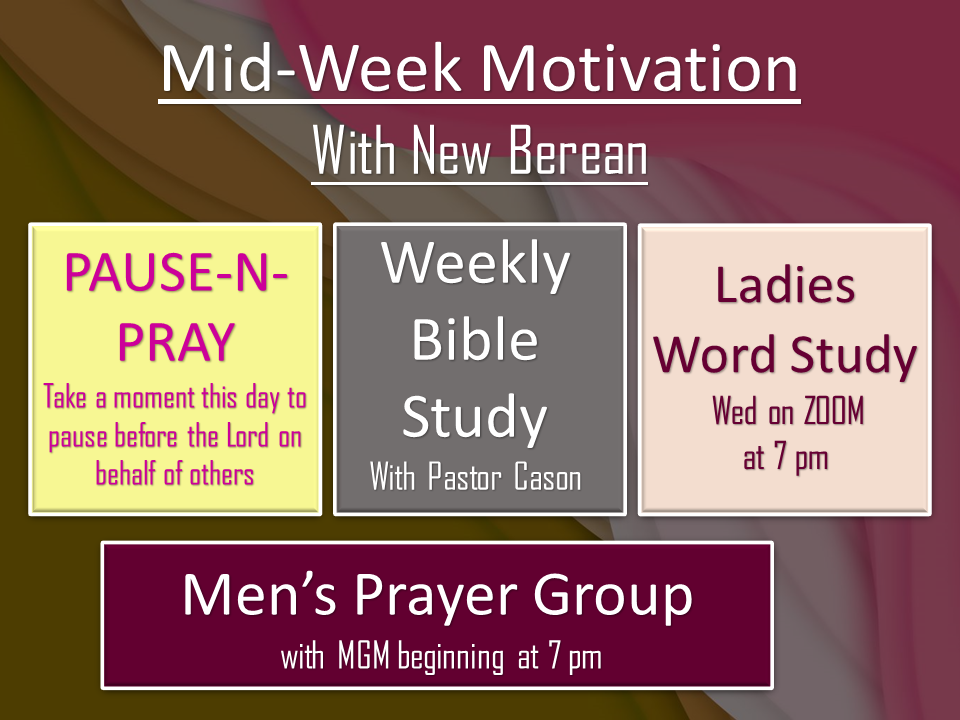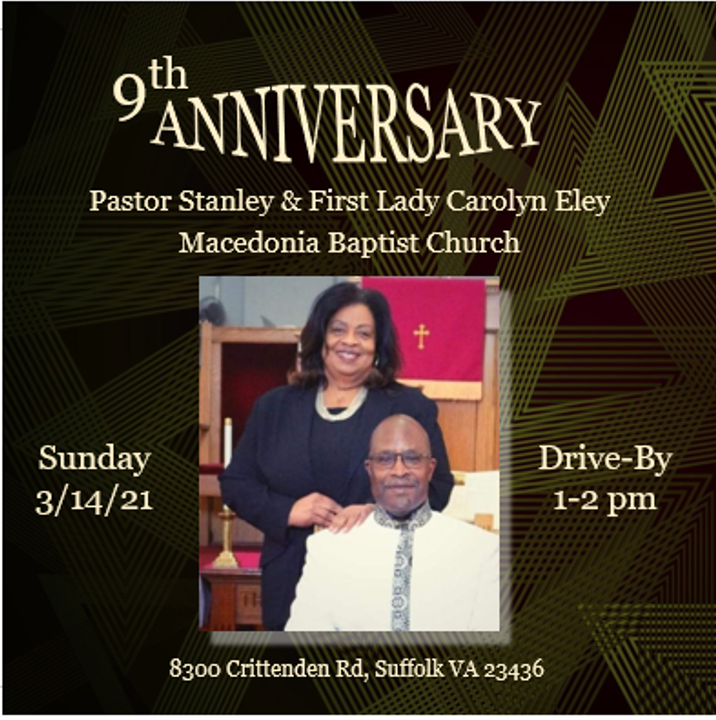Join us for a moment of prayer. Men ONLY

Join us for a moment of prayer. Men ONLY

Join our Mid-Week motivation to help keep us encouraged, focused and motivated to live for Christ. We are encouraged to contend for the faith (Jude 1:3) as we see the day approaching (Heb. 10:25). Things are not as they used to be and may never return to what we once new. But in the meantime, we are challenged to continue to trust in the Lord but even more, we should encourage one another. New Berean ministry would like to remind us to take advantage of the opportunities we have to do just what the Lord expects of us.

For many of us, Wednesday marks a time of renewal and refreshing. A time to reflect on the things of God since Sunday and store up for the rest of the week. Here at New Berean, we have a couple opportunities to gather ourselves for the daily challenges to grow in Christ
We want you to be encouraged and connected.

This gallery contains 2 photos.
Celebrate the 9th Anniversary of Pastor Stanley and First Lady Carolyn Eley with Macedonia Baptist Church.
Surprise them with your presence as they honor the Lord for the gift of their Pastor. Pastor Eley faithfully and formerly served New Berean as Deacon, Sunday School Superintendent and Associate Pastor.

Periodically, the Virginia Department of Health will present updated information for the residents and guests of the state of Virginia. As a means to minister to the family and friends of New Berean, below is the most recent update on the COVID 19 vaccination distributions.
If you planning to get your shot, login to the VDH site here and fill out the form and get registered.
(Click on the above link to the VDH website on COVID Vaccinations)
While the supply is limited, COVID-19 vaccine will be provided to specific groups of people over a number of phases. Virginia guidance was adapted from Centers for Disease Control and Prevention (CDC) recommendations that aim to (1) decrease COVID-19 deaths and serious disease, (2) preserve functioning of society, and (3) reduce the extra burden COVID-19 is having on people already facing disparities.
Definition of Healthcare Personnel (HCP)
HCP by Order of Risk
To the extent possible, vaccination opportunities should first be aimed at those at greater risk before those at less risk. However, opportunities to vaccinate other HCP efficiently and quickly should not be missed.
How HCP Can Access Vaccination
Healthcare systems and local health departments are working collaboratively to vaccinate healthcare personnel.
HEALTHCARE SYSTEMS are vaccinating their staff. Many are vaccinating non-health system staff as well.
LOCAL HEALTH DEPARTMENTS are compiling lists of healthcare providers who are not affiliated with a hospital or health system and are reaching out to those groups as quickly as possible.
INFORMATION FOR HEALTHCARE EMPLOYERS
Definition of Long-Term Care Facilities by Order of Risk
Long-Term Care staff include:
How LTCF Staff and Residents Can Access Vaccination
In Virginia, most LTCF residents and staff will be vaccinated by CVS and Walgreens teams through the Federal LTCF Pharmacy Partnership program. A small number of facilities that were not included in the program will work with their local health districts to ensure vaccination of their staff and residents.
While the supply is limited, COVID-19 vaccine will be provided to specific groups of people over a number of phases. Virginia guidance was adapted from Centers for Disease Control and Prevention (CDC) recommendations that aim to (1) decrease COVID-19 deaths and serious disease, (2) preserve functioning of society, and (3) reduce the extra burden COVID-19 is having on people already facing disparities.
Definition of Frontline Essential Workers
Workers who are in sectors essential to the functioning of society, are at substantially higher risk of exposure to SARS-CoV-2, and cannot work remotely. Frontline Essential Workers include:
For definitions of the occupational groups of the frontline essential workers listed above, see pages 9-16 of Guidance on the Essential Critical Infrastructure Workforce: Ensuring Community and National Resilience in COVID-19 Response.
Frontline Essential Workers by Order of Vaccination Planning
Because there is not sufficient supply at this time to vaccinate everyone in Phase 1b at the same time, local health districts will reach out to engage the Frontline Essential Worker groups in vaccination planning in the following order:
Overlap of vaccination of groups is expected to ensure people in Phase 1b are vaccinated as quickly and efficiently as possible. Opportunities to vaccinate Frontline Essential Workers should not be missed.
How Frontline Essential Workers Can Access Vaccination
Local health departments, pharmacies, healthcare systems, and employer-based occupational health units are working collaboratively to vaccinate frontline essential workers. Frontline essential workers may be most likely to receive the vaccine through employer-based vaccination clinics. Others will get it through their local health department or through arrangements with pharmacies and healthcare providers. Information will be coming out from local health departments, employers, and healthcare providers about how and when you can receive your COVID-19 vaccine. The ability to schedule appointments will depend on the supply of vaccine available.
The risk for severe illness with COVID-19 increases with age, with older adults at highest risk. Severe illness means that a person with COVID-19 may require hospitalization, intensive care, or a ventilator to help them breathe, or they may even die. The goal of vaccinating this population is to decrease the burden of disease and death caused by COVID-19. During Phase 1b, roughly half of each local health district’s allocation of doses should be used for this population.
How Persons Aged 65 years and Older Can Access Vaccination
Many of the people who are included in Phase 1b because of their age will be offered the vaccine through their healthcare provider. Others in this category will be able to access vaccination through their local health department or through arrangements with healthcare systems and pharmacies.
This group is included in Phase 1b because they are at increased risk of severe illness from COVID-19, which can result in hospitalization and death. The goal of vaccinating this population is to decrease the burden of disease and death caused by COVID-19.
The list of medical conditions is updated routinely as new data become available at https://www.cdc.gov/coronavirus/2019-ncov/need-extra-precautions/people-with-medical-conditions.html
Healthcare providers may use clinical judgement to determine if a patient’s medical condition or disability warrants prioritization for vaccination.
How Persons Aged 16 through 64 Years with a High Risk Medical Condition or Disability Can Access Vaccination
Many of the people who are included in Phase 1b because of their age will be offered the vaccine through their healthcare provider. Others in this category will be able to access vaccination through their local health department or through arrangements with healthcare systems and pharmacies. Information will be coming out from local health departments and healthcare providers about how and when people in Phase 1b can receive their COVID-19 vaccine.
People living in correctional and detention facilities are at greater risk for COVID-19 because of close living arrangements with other people. People living in homeless shelters are at increased risk because homeless services are often provided in congregate settings, which could facilitate the spread of infection. Because many people who are experiencing homelessness are older adults or have underlying medical conditions, they may also be at increased risk for severe illness. Individuals in migrant labor camps may experience living arrangements or working conditions that put them at greater risk of getting COVID-19. Some migrant workers also have limited access to health care, as well as certain underlying medical conditions that put them at increased risk of severe illness from COVID-19, compared to the rest of the U.S. population.
How Persons Living in Correctional Facilities, Homeless Shelters, and Migrant Labor Camps Can Access Vaccination
The Department of Corrections, local and regional jails, and their occupational health programs will vaccinate staff and persons living in correctional facilities, with local health department assistance as needed. Those living in homeless shelters and migrant labor camps will receive the vaccine through their local health department or through arrangements with healthcare systems and pharmacies.